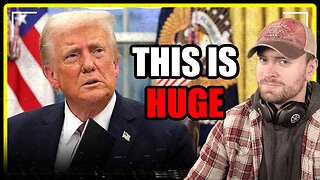Premium Only Content

The Debate on Preemptive Strikes: A Critical Question
The debate on preemptive strikes is a critical question in international relations and military strategy, raising complex issues of morality, legality, and long-term consequences. Preemptive strikes refer to the use of military force to neutralize an imminent threat before it fully materializes. Proponents argue that in an era of increasingly sophisticated weapons, waiting for an attack could be catastrophic, especially in the context of weapons of mass destruction or terrorism. They view preemptive strikes as a necessary means of self-defense, potentially preventing greater loss of life and broader conflicts.
However, critics argue that preemptive strikes often blur the line between defense and aggression, undermining international law and the principles of sovereignty. They point out that such actions can destabilize regions, provoke retaliatory attacks, and lead to unintended consequences, such as long-term military occupations or civilian casualties. Moreover, determining whether a threat is truly imminent can be highly subjective, raising the risk of miscalculations or misuse of power.
This debate is especially relevant in modern geopolitical contexts, where emerging technologies, cyber threats, and global tensions challenge traditional notions of security and conflict prevention. It calls into question how nations should balance the need for security with the risks of initiating conflict.
-
 LIVE
LIVE
Wahzdee
2 hours agoBack on BF2042 – Which Sniper Is Actually Worth It?
51 watching -
 2:31:49
2:31:49
MattMorseTV
20 hours ago $0.63 earned🔴Trump's Oval Office BOMBSHELL.🔴
33.1K46 -
 25:14
25:14
GritsGG
16 hours agoRank 1 Player Spectates Casual Solos!
18.9K -
 LIVE
LIVE
Lofi Girl
2 years agoSynthwave Radio 🌌 - beats to chill/game to
593 watching -
 4:33:40
4:33:40
FreshandFit
11 hours agoAfter Hours w/ Girls
252K133 -
 2:33:36
2:33:36
Badlands Media
11 hours agoOnlyLands Ep. 21: From Trump’s VP Pick to Green Energy Grift
78.1K17 -
 1:07:26
1:07:26
Inverted World Live
15 hours agoThe War Against Robots w/ Joe Allen
111K5 -
 6:08:31
6:08:31
SpartakusLIVE
14 hours agoWARZONE NUKE IS BACK?! || Solo Challenge CHAMPION to start, duos w/ the Dawg later
111K1 -
 1:00:18
1:00:18
Man in America
16 hours agoBig Pharma’s Empire of Lies Is COLLAPSING as People Turn to Natural Medicine
71.9K30 -
 7:17:44
7:17:44
Drew Hernandez
18 hours agoGHISLAINE MAXWELL SAYS CLAIMS EPSTEIN WAS INTELLIGENCE ASSET ARE BULLSH*T?!
41.8K41